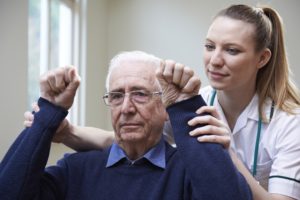 Muscle loss is associated with disability after a stroke, according to research findings. The study looked at body weight and composition during the follow-up year after ischemic stroke and their association with disability. The researchers found that 21 percent of patients developed cachexia – weakness or wasting of the body – one year later, which translates to a five percent reduction in body weight. This included a 19 percent reduction in body fat and 6.5 percent reduction in muscle mass.
Muscle loss is associated with disability after a stroke, according to research findings. The study looked at body weight and composition during the follow-up year after ischemic stroke and their association with disability. The researchers found that 21 percent of patients developed cachexia – weakness or wasting of the body – one year later, which translates to a five percent reduction in body weight. This included a 19 percent reduction in body fat and 6.5 percent reduction in muscle mass.
Patients with body and muscle wasting have significantly reduced functioning abilities along with reduced hand grip strength.
Advertisement
Study author Dr. Nadja Scherbakov explained, “Stroke is the main cause of adult disability, and it is a common understanding that this is all due to brain injury and impaired innervation. Our findings show that the amount of skeletal muscle throughout the body declines after stroke. This opens the door for treatment options such as dietary supplementation and exercise training to prevent muscle wasting after stroke.”
“The disability caused by stroke is usually attributed to brain damage, with little attention paid to the effector organ, which is the skeletal muscle. Exercise training is the most promising way to delay or prevent progression of muscle wasting and may be a therapy option. Treatment of cachexia includes dietary supplementation with protein, vitamins and minerals, and might also prevent muscle wasting after stroke. Older patients with moderately severe stroke were particularly prone to developing cachexia after stroke, so it is very important to monitor their body weight, appetite and nutritional status,” she continued.
Patients with cachexia had greater widespread inflammation. Having inflammation was linked with a higher risk of muscle wasting, weight loss, reduction in appetite, and a higher likelihood of weak handgrip strength. Dr. Scherbakov suggested this reveals that inflammation contributes to muscle and body wasting.
Also read:
- How to recover from a stroke naturally
- Sarcopenia (Age-related Muscle Loss): Causes, Symptoms, Diagnosis, Nutrition, & Exercises
- 4 Signs that reveal muscle loss
- 4 ways to prevent muscle loss as you age
